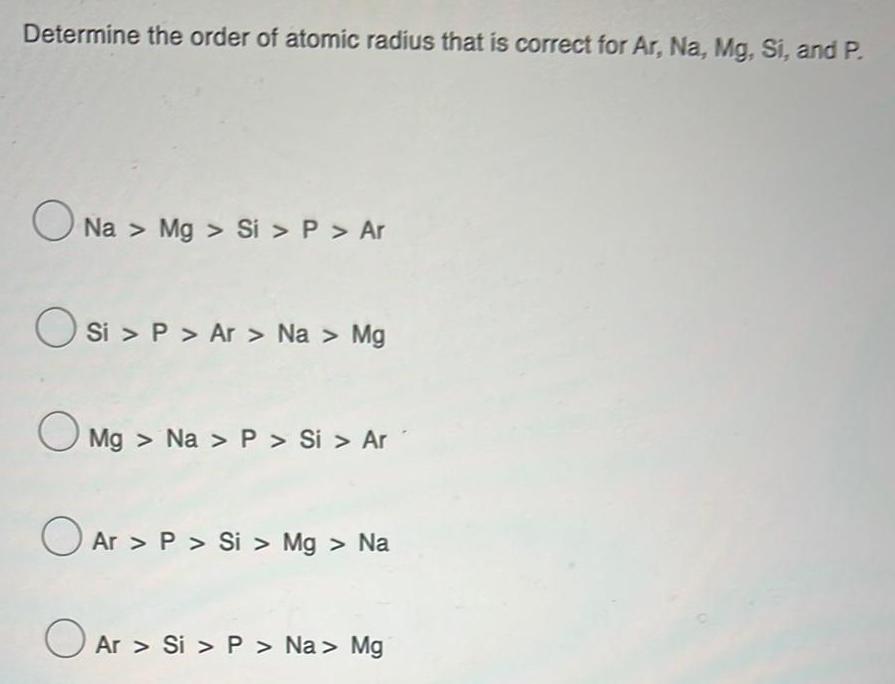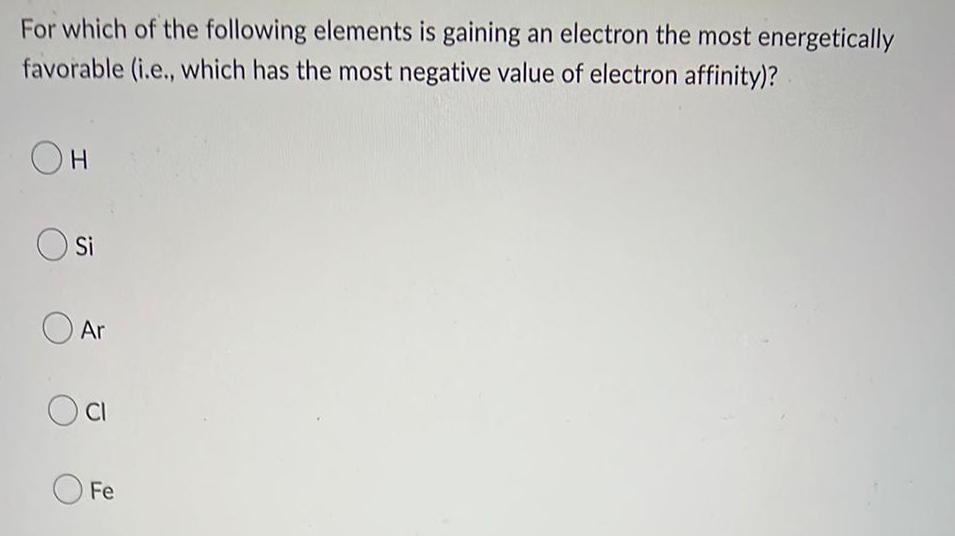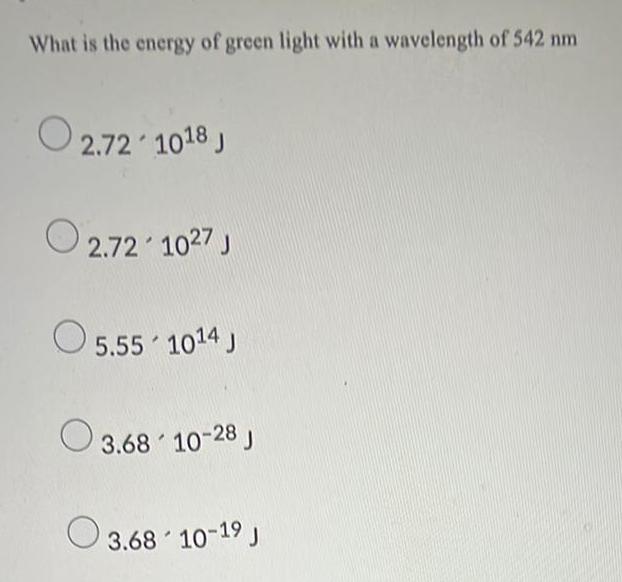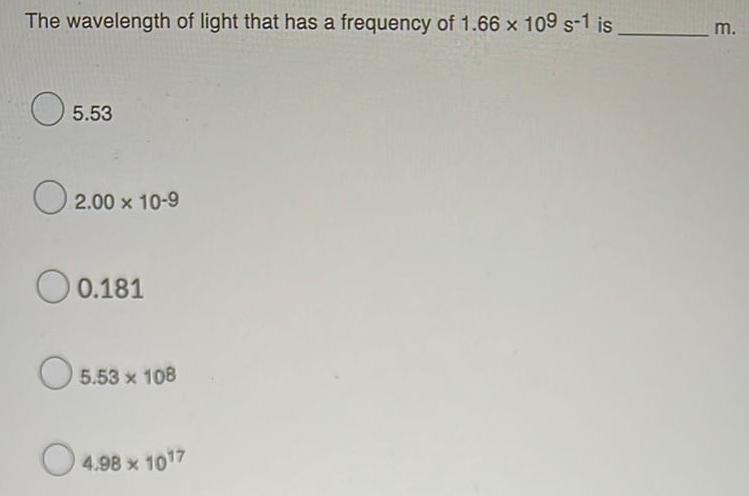Organic Chemistry Questions
The best high school and college tutors are just a click away, 24×7! Pick a subject, ask a question, and get a detailed, handwritten solution personalized for you in minutes. We cover Math, Physics, Chemistry & Biology.

Organic Chemistry
General organic chemistryA reaction between lead (II) nitrate and potassium iodide is a
synthesis reaction
single displacement reaction
combustion reaction
double displacement reaction

Organic Chemistry
Practical DetectionIs the following reaction endothermic or exothermic? H₂(g) + I₂(g) → 2HI + 21 kJ
exothermic
endothermic


Organic Chemistry
General organic chemistryWhich set of numbers will correctly balance the given equation?
Mg(NO3)₂(aq) + Na₂Cr₂O7(aq) → MgCr₂O7(s) +_ NaNO3(aq)
-1, 1, 1, 2
1, 2, 2, 2
1,4, 1, 2
2, 1, 1, 4

Organic Chemistry
Practical DetectionA student is making a measurement with a metric ruler that can measure to the tenths of a centimeter. Which of the following would be the student's properly recorded measurement with this ruler?
47 cm
47.1 cm
47.13 cm
47.134 cm

Organic Chemistry
Chemistry in Daily LifeIf the ions Fe+2 and O-2 react, what ionic formula will result?
Fe+2O-2
Fe²O2
FeO
Fe³O²

Organic Chemistry
Chemistry in Daily LifeExplain how iconic and covalent bonds are
similar and how they are different. Give an
example of two elements that would
ionically bond, and two elements that
would covalently bond.

Organic Chemistry
General organic chemistryAtom X has 27 protons, 29 neutrons, and 27 electrons. Atom Y has 27 protons, 30 neutrons, and 27
electrons. Atoms X and Y are _.
isomers
isobars
isotopes
isoelectronic

Organic Chemistry
General organic chemistryDetermine the type of reaction shown and balance the equation. In addition, explain the process you used to balance the equation.
Na + O₂ → Na₂O

Organic Chemistry
General organic chemistryHund's Rule is being broken in which of the following orbital diagrams?

Organic Chemistry
General organic chemistryWhich of the following statements is NOT part of Dalton's atomic theory?
All matter is made up of atoms
Atoms of two or more different elements combine to form compounds
The nucleus of an atom is dense and positively charged
Atoms are never created or destroyed during a chemical reaction

Organic Chemistry
Chemistry in Daily LifeWhich of the following is an ionic compound?
NH3
CH4
Na₂O
C12H22011

Organic Chemistry
Chemistry in Daily LifeCalculate the density of a substance occupying a volume of 270.0 mL and having a mass of 120.5 g.
0.4463 g/mL
2.241 g/mL
3.254 x 104 g/mL
270.0 g/mL

Organic Chemistry
General organic chemistryCarry out the following calculations with the correct number of significant figures: 22.41 +0.523 + 26.4012
49.3342
49.334
49.33
49.3

Organic Chemistry
General organic chemistryWhich of these is not suitable for the synthesis of 3-methyl butanoic acid?
treat 1-bromo-2-methyl-propane with Mg, ether, than treat with CO2, then aqueous acid workup
3-methyl but-1-ene treated with B₂H6-THF, followed by H₂O₂ in NaOH; then treat with Na₂Cr₂O7 in aq. H₂SO4
4-methyl pent-1-ene treated with hot acidic KMnO4
2-bromo-3-methyl butane treated with NaCN followed by hydrolysis (H3O+, heat)

Organic Chemistry
General organic chemistryWhen multiplying or dividing measured numbers, we use the measurement with the least number of
significant figures to determine the number of significant figures (sf) in our answer. For example:
3.5 cm x 4.75 cm = 17 cm² (even though the calculator gives 16.675) Solve the following problems
assuming all are measured numbers. Report the correct number of significant figures.
a. 7.00 x 15.00 =
b. 40.21.901 =
c. (0.003) (13.2) =
d. 1.590 0.3975 =

Organic Chemistry
General organic chemistryArrange in the increasing order of pka.
2-bromo-3-methyl-butanoic acid (A)
3-bromo-2-methyl butanoic acid (B)
2-ethyl-3-methyl butanoic acid (C)
2-chloro-3-methyl butanoic acid (D)
A<B<D<C
D<B<A<C
D<A<B<C
C<B<A<D

Organic Chemistry
Practical DetectionIn chemistry the volume for a certain gas is given by V = 20T, where Vis measured in cc and T is temperature in °C. If the temperature varies from 70°C to 120°C, find the set of volume values. (Enter your answer using interval notation.)

Organic Chemistry
Chemistry in Daily LifeIndustrial agriculture requires
A. no fertilizer
B. large amounts of water
C. no pesticides
D. only renewable energy sources

Organic Chemistry
Chemistry in Daily LifeWhat volume of hydrogen gas, at standard conditions (STP), can be liberated by the
reaction of sulfuric acid with 0.067 g Mg?
Write a balanced equation for the reaction?
Determine the volume of H₂ liberated?
In a different trial but same experiment, calculate the mass of
magnesium metal that should be used to generate 50.0 mL of H₂ at standard
conditions.

Organic Chemistry
Chemistry in Daily LifeRefer to the following unbalanced equation:
C6H14+ O2 CO2 + H₂O
What mass of oxygen (O₂) is required to react completely with 19.5 g of C6H14?
5.93 × 10³ g
34.4 g
7.24 g
68.8 g
0.226 g

Organic Chemistry
Practical DetectionA chemist reacts 101.66 g of O2 and 25.47 g of C3H8 as shown below.
O₂ + C3H8 --> CO₂ + H₂O
Part a) Calculate the maxium mass of CO2 that can be produced.
Part b) Identify the limiting reactant.
Part c) Calculate the maximum mass of H2O that can be produced from
this reaction.
Part d) When complete, the reaction actually produced 38.95 g of H2O.
Calculate the percent yield.
Select all answer choices that apply to questions a-d.
Note: calculated values are rounded to 2 decimal places.

Organic Chemistry
General organic chemistryA 1.9-mol sample of KCIO3 was decomposed according to the equation
2KCIO,(s)→2KC(s) + 30₂ (g)
How many moles of O₂ are formed assuming 100% yield?
1.3 mol
1.6 mol
1.9 mol
1.0 mol
2.8 mol

Organic Chemistry
Practical DetectionWhat is the wavelength of light associated with an n=3@n=2 transition in a
hydrogen atom,
443 nm
656 nm
091 nm
2.74 106 m
3.65-10-7 m-1

Organic Chemistry
Practical DetectionDetermine the order of atomic radius that is correct for Ar, Na, Mg, Si, and P.
Na > Mg > Si > P > Ar
Si > P> Ar> Na > Mg
Mg > Na > P > Si > Ar
Ar > P > Si > Mg > Na
Ar > Si > P > Na> Mg

Organic Chemistry
Practical DetectionFor which of the following elements is gaining an electron the most energetically
favorable (i.e., which has the most negative value of electron affinity)?
H
si
Ar
CI
Fe

Organic Chemistry
General organic chemistryWhich set of quantum numbers below describe the electron that is highest in energy.
n=4, 1=2, m₁ = 2₁ mg = + ½
n= 1, 1 = 0, m₁ = 0, ms = + ½
n= 1, 1 = 0, m₁ = 0, ms = -1/2
n = 4,1 = 2, m₁= 3, mç = -1/2
n=3, 1=2, m₁ = 1, ms = +½

Organic Chemistry
General organic chemistryWhat is the valence electron configuration of a group 2 element.
ns²np7
ns²
ns¹
ns² np5
ns²np6

Organic Chemistry
General organic chemistryHow many valence electrons are in an atom of gallium?
three
five
one
four
two

Organic Chemistry
General organic chemistryWhat is the energy of green light with a wavelength of 542 nm
2.72 1018 J
2.72 1027 J
5.55 1014 J
3.68 10-28 J
3.68 10-19 J

Organic Chemistry
General organic chemistryThe wavelength of light that has a frequency of 1.66 x 109 s-1 is
5.53
2.00 × 10-9
0.181
5.53 x 108
4.98 × 1017

Organic Chemistry
Chemistry in Daily Life1. When a sample of solid at 35°C (specific heat capacity = 0.89 J/g "C) is heated using 75.5J of energy, its temperature was raised to 48°C. What is the mass of this solid ? Give your answer using the correct significant figure

Organic Chemistry
General organic chemistrySelect the most metallic element from the group below.
sodium
calcium
barium
cesium
magnesium

Organic Chemistry
Chemistry in Daily LifeSelect the formula unit for the compound that consists of iron(II) and the phosphide ion.
Fe₂P
Fe3P2
FePO4
FeP2
FeP

Organic Chemistry
General organic chemistryHow many orbitals are present in the n = 4 shell of an atom?
32
4
10
16
5
![The ground-state electron configuration of the element is [kr]5s14d5.
OTC
OMn
Mo
cr
Nb](https://media.kunduz.com/media/sug-question/raw/81324244-1659897905.684953.jpeg?w=256)
Organic Chemistry
General organic chemistryThe ground-state electron configuration of the element is [kr]5s14d5.
OTC
OMn
Mo
cr
Nb

Organic Chemistry
General organic chemistryWhich of these elements has the highest first ionization energy?
Rb
Li
Ne
O
F

Organic Chemistry
General organic chemistryIndicate the ground state electron configuration for aluminum.
15²2s²2p¹
15²25²2p635¹3p²
15²25²20635²
15²25²2p63s²3pº
15²25²2635²3p¹

Organic Chemistry
General organic chemistryIn which set of elements would all members be expected to have very similar chemical properties?
Br, I, At
Ne, Na, Mg
P, Se, I
Si, As, Te
Cl, Br, Na

Organic Chemistry
General organic chemistryWhat is true below for an atom that is in its ground state electron configuration.
Unpaired electrons in the same orbitals have opposite spins.
Orbitals within a subshell are filled to maximize the pairing of electrons.
Electrons are promoted to a higher-energy orbital before they are paired in the
same orbital.
Electrons fill higher-energy shells before filling lower-energy shells.
Unpaired electrons in different orbitals have opposite spins.

Organic Chemistry
Chemistry in Daily LifeHow many moles of CO₂(g)are produced when 10 moles of O₂(g) react by the reaction
C(s) +O₂(g)→→ CO₂(g)
Assume all reactants and products are at the same temperature and pressure.
5
10
15
20

Organic Chemistry
General organic chemistryWhich of the following is NOT a structural isomer of 2-methylpentane?
1. 1,2 dimethylbutane
2. hexane
3. 2,2-dimethylbutane
4. 2,2-dimethylpropane
5. 2 ethyl butane

Organic Chemistry
Chemistry in Daily LifeThe element with atomic number 30 is
a transition element
a non-metal
a noble gas
an alkali metal

Organic Chemistry
General organic chemistryIdentify the atom with the ground-state electron configuration shown for its valence shell.
4s²3d¹04p6

Organic Chemistry
General organic chemistryThe name 4-ethylpentane is not an accepted name for the compound described. What
would be the correct name for this compound?
1. 2-ethylpentane
2. 4-methylhexane
3. 1-ethyl-1-methylbutane
4. 3-methylhexane
5. n-heptane

Organic Chemistry
HydrocarbonsStarting with 2-bromobutane, which of the following reagents would you use to produce 1-butene as the major product?
1.
2.
3.
4.
1) CH₂CH₂ONA / CH₂CH₂OH
2) ((CH₂)CH)₂NLi / ether
3) CH₂SNa / acetone
4) CH₂CO₂Na/CH₂CO₂H

Organic Chemistry
Alcohols and PhenolsWhen CH3CCI is treated with excess phenylmagnesium bromide in ether, with subsequent aqueous work up, the resultant product:
can undergo elimination with Kotbu
can be oxidized by jones reagent
can be reduced with Lithium aluminum hydride
can undergo SN2 reaction to produce alkyl halide

Organic Chemistry
General organic chemistryThe pk, of acetic acid, CH3COOH, is 4.76. What is the value of the equilibrium constant Keq, for the following equilibrium? Show work using the equation function from the menu above
CH₂COOH + H₂O
H₂00+ CH₂COO

Organic Chemistry
Reactions of benzeneTo produce butyl benzene, what would be a correct approach?
treat butyl chloride+AlCl3 with Benzene and then treat with H₂N-NH2 followed by NaOH
Treat Benzene with Br2+FeBr3 then treat with Mg, ether, then treat with butanol
treat butyl chloride +AICI3 with Benzene
Treat CH3CH₂CH₂COCI + AICI3 with benzene and then treat it with Zn(Hg) HCI

Organic Chemistry
General organic chemistryUsing the periodic table, what do you know about Indium?
It is a large metal and likely to react with nonmetals.
It is a small metal and unlikely to react with anything else
It is a small nonmetal and likely to react with other metals
It is a large nonmetal and unlikely to react with other metals
It is a large nonmetal and likely to react with other nonmetals